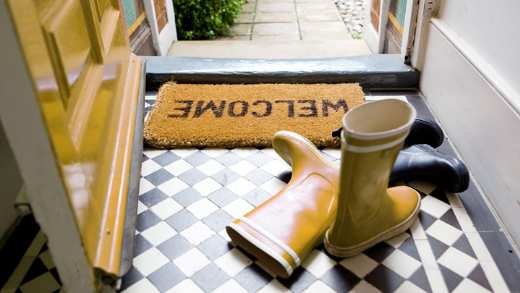
Aviva urges homeowners to get prepared with winter-ready checklist.
Seventy percent of homeowners admit to ignoring property problems, because they’d rather spend their time and money on other things, according to new research from Aviva*.
The recent study of 2,000 homeowners shows property maintenance is way down many people’s priority lists. Aviva found:
- More than a quarter of homeowners (27%) ignore minor faults around the home until they become bigger problems that need to be addressed.
- A fifth (19%) turn a blind eye so they can spend their money elsewhere.
- Almost a quarter (23%) say they don’t have the time to deal with minor home maintenance issues.
While one in 10 homeowners (9%) deliberately overlook problems around the home, in the hope someone else will deal with them.
The research was carried out to highlight the importance of home maintenance and help homeowners to ensure their properties are ready for winter. Aviva has the following guidance for homeowners:
Aviva’s checklist for winter-ready homes
- Check your roof for missing or damaged tiles or slates and replace where necessary. Water damage can spread far and wide, so it’s important to prevent rain getting in.
- Call out a chimney sweep. Unswept chimneys pose a greater fire risk, so as the weather gets colder, sweep before you light your fire or stove.
- Clear out gutters and drains, removing any leaves, dirt and debris, so water can drain freely.
- Secure any wobbly fences and broken gates to ensure they will withstand wind and stormy weather.
- Get your boiler serviced by a professional. It’s also a great time to think about boiler cover in case of any break-downs.
- Insulate on top of pipes: one of the main causes of freezing pipes is a lack of lagging. Insulation should be laid on top of pipes rather than underneath them, as insulation laid below the pipes will prevent rising heat reaching them. Wrap up water tanks and cisterns in insulating jackets.
- Insulate your loft. When temperatures fall, this will help to prevent heat escaping from the top of your home.
- Check your doors and windows and replace any damaged seals to prevent the wind whistling through.
- Consider leaving the heating on: if you are going away for a few days or weeks, consider leaving the heating on at a constant low level, so water in pipes will remain at a constant temperature and should not get cold enough to freeze.
- Check the taps: repair any dripping taps and don't forget to insulate outside taps in your garden or garage (or turn off the water supply to them altogether).
A winter-ready home check-list can also be found online here.
Adam Beckett, Product Director for Aviva UK General Insurance says: “A home is often the biggest purchase people will make, but homeownership also brings responsibilities and costs.
"Maintenance is a crucial part of owning a property, and as with many things, little and often is the best way to stay on top. By taking care of issues quickly, as and when they crop up, people can avoid small niggles becoming big problems.
“Now’s a great time to make sure homes are winter-ready before the worst of the weather arrives – so think about tasks like clearing out gutters, securing fences and dealing with any loose roof tiles. As ever, prevention is better than the cure, so it’s worth devoting some time to home maintenance now, to avoid issues in the future.”
Budgeting for home maintenance
The study revealed positive news about budgeting for home maintenance. The vast majority of homeowners (92%) hold some savings which could be used on their properties in the event of an emergency.
Faced with unexpected bill of £5,000 for home essentials due to wear and tear - such as roof repairs or new windows:
of homeowners said they would be able to cover the cost from savings.
would use a credit card or loan.
would borrow from family or friends.
would arrange a temporary fix until they could afford the full amount.
However, a number of respondents said they would claim on their home insurance to cover such a bill, indicating confusion amongst some homeowners. While home insurance is designed to cover unexpected events, damage caused through wear and tear is generally excluded.
Adam Beckett adds: “We know from our research that there’s some confusion about what is or isn’t covered under home insurance. For example, 30 per cent** of UK adults think home insurance would cover “anything” that happens in their home, while one in 10 believe it covers wear and tear - but this is not the case. Home insurance is usually designed to cover sudden, unexpected events.
“No-one wants to be in a situation where they think they’re insured, only to be disappointed if they try to make a claim. We’d urge all customers to read their policy documentation and check with their insurer, to make sure they have the cover which best fits their needs.”
- ENDS -
References:
*Research carried out by Censuswide research in August 2019, interviewing 2,007 homeowners across the UK. All statistics relate to this study unless otherwise stated.
**Source: Aviva ‘Busting The Myths’ report, January 2017.
Media enquiries:
Sarah Poulter
UK External Communications
-
Phone
-
+44 (0) 7800 691 569
-
-
Email
Notes to editors:
- We are the UK's leading diversified insurer and we operate in the UK, Ireland and Canada. We also have international investments in India and China.
- We help our 19.2 million (as at 31 December 2023) customers make the most out of life, plan for the future, and have the confidence that if things go wrong we’ll be there to put it right.
- We have been taking care of people for more than 325 years, in line with our purpose of being ‘with you today, for a better tomorrow’. In 2023, we paid £25.6 billion in claims and benefits to our customers.
- In 2021, we announced our ambition to become Net Zero by 2040, the first major insurance company in the world to do so. We are aiming to have Net Zero carbon emissions from Aviva’s operations and supply chain by 2030. While we are working towards our sustainability ambitions, we recognise that while we have control over Aviva’s operations and influence on our supply chain, when it comes to decarbonising the economy in which we operate and invest, Aviva is one part of a far larger global ecosystem. There are also limits to our ability to influence other organisations and governments. Nevertheless, we remain focused on the task and are committed to playing our part in the collective effort to enable the global transition. Find out more about our climate goals at www.aviva.com/climate-goals and our sustainability ambition and action at www.aviva.com/sustainability
- Aviva is a Living Wage, Living Pension and Living Hours employer and provides market-leading benefits for our people, including flexible working, paid carers leave and equal parental leave. Find out more at https://www.aviva.com/about-us/our-people/
- As at 31 December 2023, total Group assets under management at Aviva Group were £376 billion and our estimated Solvency II shareholder capital surplus was £8.8 billion. Our shares are listed on the London Stock Exchange and we are a member of the FTSE 100 index.
- For more details on what we do, our business and how we help our customers, visit www.aviva.com/about-us
- The Aviva newsroom at www.aviva.com/newsroom includes links to our spokespeople images, podcasts, research reports and our news release archive. Sign up to get the latest news from Aviva by email.
- You can follow us on:
- X: www.x.com/avivaplc
- LinkedIn: www.linkedin.com/company/aviva-plc
- Instagram: www.instagram.com/avivaplc
- For the latest corporate films from around our business, subscribe to our YouTube channel: www.youtube.com/user/aviva
















